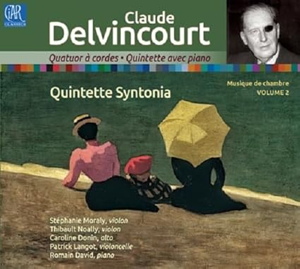
Claude Delvincourt (1888-1954)
String Quartet, Op. posth (1954)
Piano Quintet (1908)
Quintette Syntonia
rec. 2022, Auditorium Marcel Landowski, Paris, France
Ciar Classics CC016 [66]
The last time I heard Claude Delvincourt’s String Quartet was in the work’s première recording by the dedicatees, the Parrenin Quartet (review). That c.1956 recording, made after the composer’s death in a car crash, was part of an all-Delvincourt release from Forgotten Records that included the troubled, and troubling, Violin Sonata. This new one couples the Quartet with the early Piano Quintet for a stylistically wildly divergent diptych.
The Quintette Syntonia, in its quartet formation, takes the work powerfully but nowhere as powerfully as the Perennin did. Tempo relaxation allows Delvincourt’s polyphony to come across that much more graphically – it also draws attention to his near twelve-tone writing – and in the succeeding Scherzo their playing is more obviously luminous than the mono-era Parrenin – lines are clarified and there’s more colour to be heard, obviously, in a modern recording than could ever be heard in one that is now nearly seventy years old. I like the way they deal with almost-popular theme that briefly threatens to derail the Scherzo. The slow movement shows the divergent natures of the two approaches, with the Syntonia foursome taking their time to sculpt the music’s anguish and also to explore its twilit beauty. If the Parrenin tend to bind these elements more cohesively, then there is pleasure in hearing a sympathetic, more extended take on the music. Delvincourt’s breathless changeability is shown most vividly in the finale, where again the Parrenin show a fleeter pair of heels. That said, the stylish Gallic elements of the music have more room to flower in this recording, though at the possible expense of structural cohesion. Ideally, you’d need both recordings – one as a stylistic control version (Parrenin) – but the newcomer is an attractive modern alternative.
The Piano Quintet was composed in 1908 and sounds as if it were written by a different composer. Here Delvincourt, just 20, was composing in the world redolent of Schmitt, Fauré, and Franck and writing a genuinely concertante role for the piano – taken here by Romain David of the Syntonia ensemble. This is the work’s première recording. Profusely lyrical with the piano leading the ensemble, restlessly so in the opening movement, this is a work of youthful bravura and quixotic elements, such as the Scherzo’s charming B section. Delvincourt’s slow movement is trademarked ‘School of Chausson and Fauré’ and his finale offers a wild ride for the intrepid pianist of the ensemble but one in which the second subject offers a more curvaceous and winsome melodic line, with a resumption of the nervous vitality to end with vehemence and hectic intensity. At 9:30 in the finale my copy skipped but mine might be a rogue CD.
These two chamber works show the young and older Delvincourt in his many guises. He remains a wrong-footing, lively and occasionally exhausting composer, rooted in French lyricism but broadening over the years to include all manner of styles and moods. The performances are first class and so is the booklet documentation and recording.
Jonathan Woolf
Availability: Ciar Classics

















